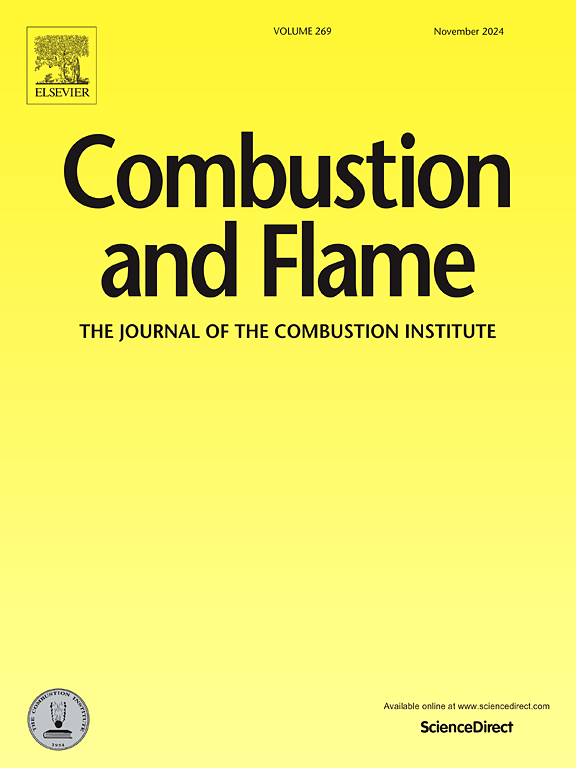Asymptotic analysis of a planar reaction front in gasless combustion: Higher order effects and the influence of the large but finite Lewis number on the propagation velocity
IF 5.8
2区 工程技术
Q2 ENERGY & FUELS
引用次数: 0
Abstract
An asymptotic analysis of a planar combustion front in a condensed phase with an arbitrary temperature dependence of thermal conductivity has been carried out by the method of matched asymptotic expansions. The Zel’dovich number is used as a large parameter, and three expansion terms are obtained for the flame velocity. The asymptotic results are compared with direct numerical calculations, and very good agreement is obtained even at low Zel’dovich numbers.
The effect of a large but finite Lewis number on the flame propagation velocity are also examined. It is shown that even at Lewis numbers of the order of the Zel’dovich number, the effect of fuel diffusion becomes significant. The presented asymptotic analysis allows us to write a uniformly valid expression for the propagation velocity that can be used both for large Lewis numbers and for Lewis numbers of order unity.
Novelty and significance statement
For the first time an analytical expression for the velocity of a planar combustion front in the condensed (gasless) phase was obtained up to third-order terms in the inverse Zel’dovich number, taking into account the arbitrary dependence of the thermal conductivity coefficient on temperature. For the first time, the influence of a small but finite reactant diffusion coefficient on the propagation velocity of a planar combustion front was analytically studied. The result allows us to write a uniformly valid formula for the flame velocity applicable in both the solid and gaseous phases.
求助全文
约1分钟内获得全文
求助全文
来源期刊

Combustion and Flame
工程技术-工程:化工
CiteScore
9.50
自引率
20.50%
发文量
631
审稿时长
3.8 months
期刊介绍:
The mission of the journal is to publish high quality work from experimental, theoretical, and computational investigations on the fundamentals of combustion phenomena and closely allied matters. While submissions in all pertinent areas are welcomed, past and recent focus of the journal has been on:
Development and validation of reaction kinetics, reduction of reaction mechanisms and modeling of combustion systems, including:
Conventional, alternative and surrogate fuels;
Pollutants;
Particulate and aerosol formation and abatement;
Heterogeneous processes.
Experimental, theoretical, and computational studies of laminar and turbulent combustion phenomena, including:
Premixed and non-premixed flames;
Ignition and extinction phenomena;
Flame propagation;
Flame structure;
Instabilities and swirl;
Flame spread;
Multi-phase reactants.
Advances in diagnostic and computational methods in combustion, including:
Measurement and simulation of scalar and vector properties;
Novel techniques;
State-of-the art applications.
Fundamental investigations of combustion technologies and systems, including:
Internal combustion engines;
Gas turbines;
Small- and large-scale stationary combustion and power generation;
Catalytic combustion;
Combustion synthesis;
Combustion under extreme conditions;
New concepts.
 求助内容:
求助内容: 应助结果提醒方式:
应助结果提醒方式:


